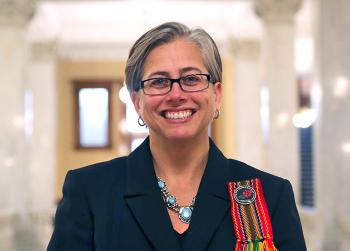Image Caption
Summary
Local Journalism Initiative Reporter
Windspeaker.com
An issue that has polarized the member governments of the Métis National Council (MNC) for the last few years has yet to be addressed formally, despite a motion made last September to create an expert panel to “review the history of the seven Ontario communities through the lens of the national definition (of Métis) and contemporary Métis governance.”
Since 2017 when the Métis Nation of Ontario (MNO) and the Ontario government announced there were seven “historic Métis communities in the province that meet the Powley test criteria” there has been dissension in Métis groups across the country.
Leading the way in opposing the expansion of the Métis Homeland map far east into Ontario beyond its current border was the Manitoba Métis Federation (MMF). That opposition culminated last September with the MMF withdrawing from the MNC.
In a court-ordered special general assembly, the remaining Métis governments—Alberta, Saskatchewan and British Columbia—joined with the MNO to pass the resolution which gave the expert panel one year from the time of its initial meeting to report back to the general assembly.
Despite what seemed to be an urgent matter that led to court action for the general assembly, six months later that first expert panel meeting has yet to be held.
“There’s been some big pieces of work that had not been anticipated and that have been taking up a fair amount of time and attention,” said MNO President Margaret Froh in an exclusive interview with Windspeaker.com.
Froh is serving her second term as president. She was first elected in 2016.
The pressing work, says Froh, was the selection of the delegation to meet with Pope Francis in Rome in March; working on the bilateral mechanism to enact the Canada-Métis Accord signed in 2017; and “looking at what we inherited from the past leadership.”
MNC President Cassidy Caron, elected last September, announced in a Facebook post that the MNC was beginning legal action against former president Clement Chartier, present MMF president David Chartrand and a handful of other former MNC executives alleging “breach of fiduciary duties and the other unlawful conduct.”
The MNO has participated in all these decisions, including having a member as part of the Vatican delegation, despite not yet formally dealing with its status in the MNC.
The expert panel was established to allow the MNO the opportunity to present the work it “engaged in” with the Ontario government to identify the seven historical Métis communities from which MNO has drawn members; its ongoing registry review process; and the research and work it has undertaken to advance and secure the rights, interests and claims of Métis in Ontario.
Despite no action by the expert panel, Froh says the MNO has been sharing information with the other Métis governments, as well as reviewing its citizenship registry, which sits at around 28,000.
A registry review released in May 2021 and based on 24,000 citizenship files indicated that 23 per cent of MNO’s citizenship ancestrally is connected to western Canada and nine per cent ancestrally connected to the historic Métis community in northwestern Ontario. These two areas comprise the MNC’s Métis Homeland map. The rest—68 per cent—are ancestrally connected to the historic Métis communities currently under dispute by some.
This work, says Froh, which began in 2017, “proves the point that we are part of the Métis National Council.”
The current Métis Homeland map excludes the Métis community at Sault Ste. Marie, the home of Steve and Roddy Powley. The Powley case resulted in a significant 2003 Supreme Court of Canada ruling asserting Métis hunting rights. The decision also laid out a set of criteria—the Powley Test—to define who is entitled to exercise Métis hunting rights.
Froh contends that up until a 2018 MNC meeting when a “dramatically changed,” Métis Homeland map was presented, Sault Ste. Marie was part of the Métis Homeland map.
“Up until then the Powley community had been solid with MNC. This will be information shared as part of that panel process,” said Froh.
MNO is still claiming Sault Ste. Marie as a historic Métis community in Ontario and is one of the seven the MNO and the province have included.
“What is really clear is we represent, as we've always said, we represent Métis who tie historically to historic Ontario Métis communities like the Powley community and we also represent Métis who tie to the Métis Nation homeland west of Ontario,” she said.
As for the expert panel, Froh says that will be a discussion for the summer assembly.
“How that work moves forward at the Métis National Council level will be determined by the assembly. We (MNO) are moving forward with it and we have begun and have had some of those presentations and discussions and will be bringing it back to the assembly,” she said.
Whether that work will be concluded in the one-year time frame set out by the resolution is uncertain.
“The timeline…is probably a bit off,” she said. “The conversations have begun and we’ll see this summer when we come back to assembly how much progress we’ve been able to make.”
When the MMF left the MNC last September, MMF President David Chartrand said it was because the MNC was no longer asserting that the “true Métis Nation” had its roots in the Red River.
He said by allowing the MNO to include the additional Métis communities in Ontario, the MNC had become a pan-Aboriginal organization and not a Métis organization.
The MMF along with Métis Nation of Alberta and Métis Nation-Saskatchewan were the founding members of the MNC.
Local Journalism Initiative Reporters are supported by a financial contribution made by the Government of Canada.

